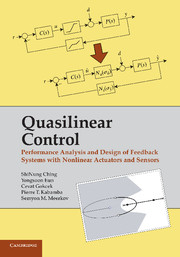 Quasilinear Control
Quasilinear Control Published online by Cambridge University Press: 01 June 2011
Motivation: This chapter is intended to quantify steady state errors and transient performance of LPNI systems in the problem of tracking reference signals.
For linear systems, the steady state error in tracking deterministic references is characterized by the notion of system type, defined by the poles of the loop gain at the origin. This definition is not applicable to LPNI systems since, if the actuator saturates, controller poles at the origin play a different role than those of the plant and, thus, the loop gain does not define the system type. This motivates the first goal of this chapter, which is to introduce the notion of system type for LPNI systems.
Also in contrast with the linear case, LPNI systems with saturating actuators are not capable of tracking steps with arbitrary amplitudes. This motivates the second goal of this chapter: to introduce and quantify the notion of trackable domains, that is, the sets of step (or ramp, or parabolic) input magnitudes that can, in fact, be tracked by an LPNI system.
As far as the transients are concerned, the usual step tracking measures, such as overshoot, settling time, and so on, are clearly not appropriate for random references. The variance of tracking errors, as it turns out, is not a good measure either, since for the same variance, the nature of tracking errors can be qualitatively different.
To save this book to your Kindle, first ensure [email protected] is added to your Approved Personal Document E-mail List under your Personal Document Settings on the Manage Your Content and Devices page of your Amazon account. Then enter the ‘name’ part of your Kindle email address below. Find out more about saving to your Kindle.
Note you can select to save to either the @free.kindle.com or @kindle.com variations. ‘@free.kindle.com’ emails are free but can only be saved to your device when it is connected to wi-fi. ‘@kindle.com’ emails can be delivered even when you are not connected to wi-fi, but note that service fees apply.
Find out more about the Kindle Personal Document Service.
To save content items to your account, please confirm that you agree to abide by our usage policies. If this is the first time you use this feature, you will be asked to authorise Cambridge Core to connect with your account. Find out more about saving content to Dropbox.
To save content items to your account, please confirm that you agree to abide by our usage policies. If this is the first time you use this feature, you will be asked to authorise Cambridge Core to connect with your account. Find out more about saving content to Google Drive.